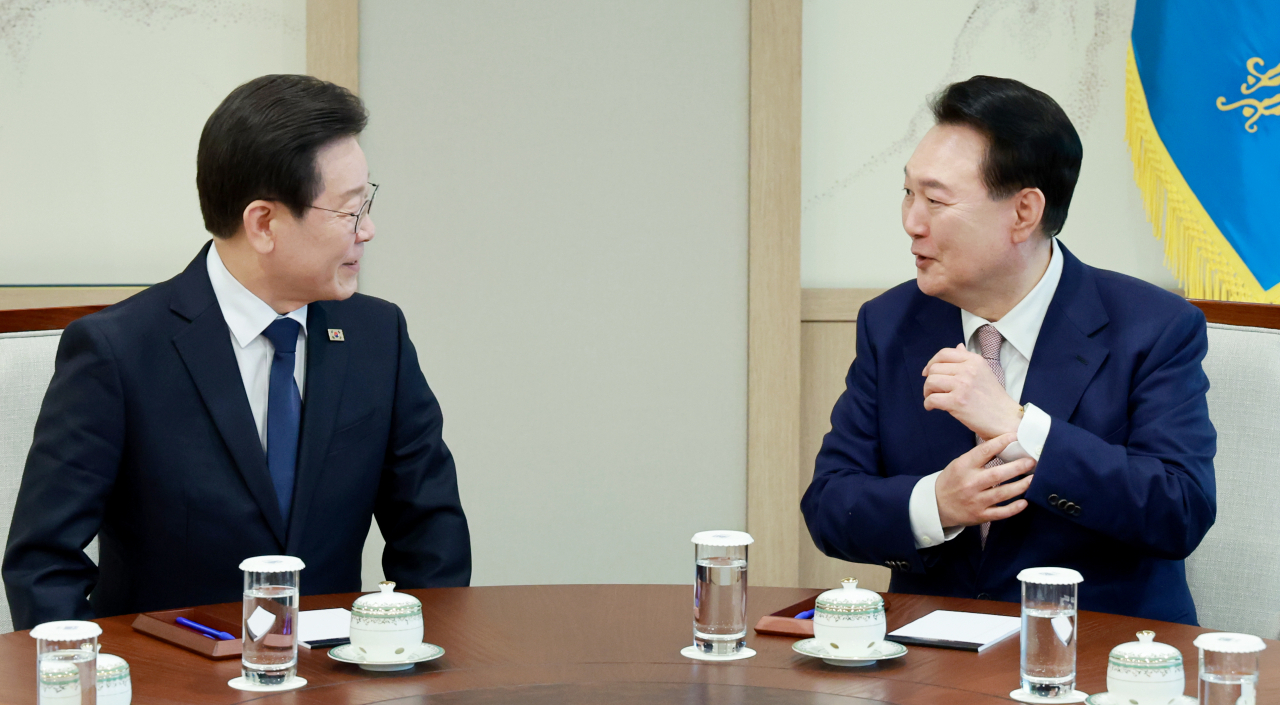 |
Democratic Party of Korea leader Lee Jae-myung, left, speaks with President Yoon Suk Yeol at the presidential office in Yongsan-gu, central Seoul on Monday. (Yonhap) |
In their first meeting ever after President Yoon Suk Yeol seized power in 2022, main opposition party leader Lee Jae-myung on Monday told the conservative president that his two years in office has been a "time of dominance and ruling with the absence of politics."
Ahead of their first official one-on-one meeting held Monday afternoon behind doors, Lee kicked off the event by thanking Yoon for setting up the meeting and expressed hope that it would become a cornerstone to present "new hope" for the Korean people, in a 15-minute opening remark.
But the amicable remarks soon turned into criticism of Yoon's presidency, in line with the Democratic Party of Korea's parliamentary election campaign which was to "bring judgment to the current dictatorship regime."
"I believe the public sentiment shown in the latest elections was a serious order (from the people) to correct national affairs," Lee told Yoon at the presidential office in Yongsan-gu, central Seoul.
"Actually there are many assessments that the past two years was a time of dominance and ruling with the absence of politics," he added.
The opposition leader also expressed concerns that South Korea was being "autocratized," blasting Yoon for "repressive actions." Lee cited a report by Sweden-based not-for-profit the Varieties of Democracy Institute in January, which categorized South Korea as one of the 10 "bell-turn autocratizers," where the index gauging the level of democracy fell sharply after hitting a peak.
"I believe the general election reflects people's (demand) ... for open communication (of the ruling bloc) and (its) cooperation (with opposition parties) instead of disruptive and repressive actions," Lee explained.
Yoon merely nodded throughout Lee's speech and thanked Lee for expressing his thoughts, adding that he was expecting such criticisms from the main opposition party leader. The presidential office later said that Yoon "understood the different stances" on the matter.
Following the meeting, Lee expressed disappointment in Yoon's "lack of willingness to bring about change," according to a briefing by Democratic Party spokesperson Rep. Park Sung-joon. At the same time, Lee said that the meeting was meaningful in the way that in "opened the first chapter" in the dialogue between the two rivals and pledged to keep the communication channel open.
As the first official meeting between Yoon and Lee was held, skeptics raised doubts as to whether the event would help bridge the gap between the two parties.
Skepticism grew as the main opposition Democratic Party continued to pressure Yoon to support and help pass several of its proposals and pending bills on Monday, mere hours ahead of the meeting scheduled for 2 p.m.
“(The meeting) would work as a testing ground for President Yoon on whether he is ready to accept the public sentiment displayed through the latest parliamentary elections,” Democratic Party spokesperson Rep. Park Sung-joon told reporters after an intra-party meeting held at the National Assembly in Seoul.
“It is also (a place where) President Yoon should respond to the Democratic Party’s proposals to improve the livelihoods of the people and (our push) to bring about a great policy shift,” he added.
While some saw the meeting as an opportunity for the rivals to forge a new partnership, others raised doubt that it could actually smooth the policy road that lies ahead for Yoon during the remaining three years of his term.
“It has become more difficult for the meeting between the president and the main opposition leader to produce solid outcomes due to amendments made to the law (in the 2000s) that prevent the president from being involved in his party’s affairs,” political commentator Park Sang-byeong said via the phone.
Park pointed to the 25 rounds of such meetings held since 1965, when the first of its kind was held under the regime of former president and military dictator Park Chung-hee and that the outcomes have become more lackluster as time passed.
One of the most successful rounds of the meeting between the presidents and the main opposition leader was held when former President Kim Dae-jung was in office from 1998 to 2003. Kim held a total of eight one-on-one meetings with former Prime Minister Lee Hoi-chang, who was the main opposition leader at the time, marking the record number of meetings held between the president and opposition leader here. The two also cooperated to pass several bills including an amendment to the Pharmaceutical Affairs Act.
Meanwhile, such meetings have been almost non-existent or less frequent in recent years, with former President Park Geun-hye failing to hold any such one-on-one meetings and former President Moon Jae-in having held only one.
Park Sang-byeong stressed that Yoon and Lee Jae-myung must come up with a more sustainable solution than just holding one-on-one meetings between themselves.
“They must launch regular meetings that involve more ranking officials from both rival parties, the government and more to make this a sustainable solution,” the expert explained.






![[Today’s K-pop] Blackpink’s Jennie, Lisa invited to Coachella as solo acts](http://res.heraldm.com/phpwas/restmb_idxmake.php?idx=644&simg=/content/image/2024/11/21/20241121050099_0.jpg)
